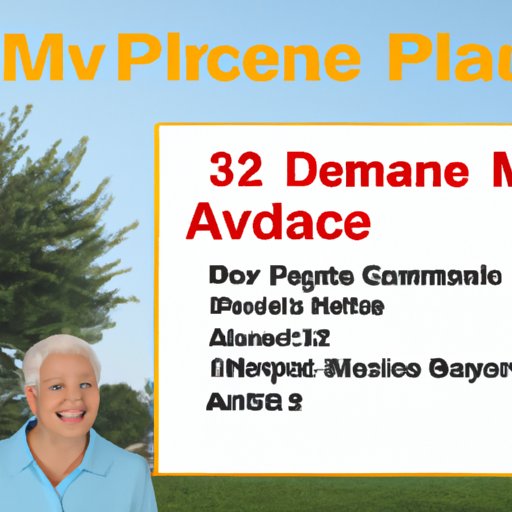Introduction
Medicare Advantage plans, also known as Part C, are a type of health insurance provided by private companies that are approved by the Centers for Medicare & Medicaid Services (CMS). These plans provide the same coverage as Original Medicare, which includes hospital (Part A) and medical (Part B) insurance, but they may also offer additional benefits such as prescription drug coverage (Part D), dental and vision coverage, and other supplemental services. The key difference between Original Medicare and Medicare Advantage is that Medicare Advantage plans are managed by private insurers, while Original Medicare is run by the government.
A Comprehensive Guide to Understanding Medicare Advantage Plans
To be eligible for a Medicare Advantage plan, you must first be enrolled in both Parts A and B of Original Medicare. Additionally, you must live in the service area of the plan you choose and not have end-stage renal disease (ESRD). Medicare Advantage plans are available in two main types: Health Maintenance Organizations (HMOs) and Preferred Provider Organizations (PPOs). HMO plans usually require you to use doctors, hospitals, and other providers within the plan’s network, while PPO plans allow you to see any provider who accepts Medicare assignment.
When it comes to costs, Medicare Advantage plans typically require a monthly premium, in addition to the premiums you pay for Parts A and B of Original Medicare. Some plans offer additional coverage without any additional cost—such as prescription drug coverage—while others may charge extra for certain services. Out-of-pocket costs vary by plan, but all plans have an annual limit on out-of-pocket spending.

Exploring the Pros and Cons of Medicare Advantage Plans
Medicare Advantage plans have several advantages over traditional Medicare. For example, many plans offer additional benefits that Original Medicare does not, such as dental and vision coverage, as well as access to a larger network of providers. Additionally, some plans may offer lower out-of-pocket costs than Original Medicare, as well as coverage for services not covered by traditional Medicare, such as chiropractic or acupuncture services.
However, there are some drawbacks to Medicare Advantage plans. For instance, you may have to pay higher premiums for certain services or if you choose to go out-of-network for care. Additionally, some plans may require prior authorization for certain services, and some services may not be covered at all. It’s important to do your research and compare plans to find one that meets your needs.

What You Need to Know Before Choosing a Medicare Advantage Plan
Before enrolling in a Medicare Advantage plan, it’s important to do your research and compare different plans. Start by looking at the coverage each plan offers and the associated costs, including premiums, deductibles, copayments, and coinsurance. Also consider any additional benefits the plan may offer, such as prescription drug coverage or dental and vision coverage. Finally, make sure the plan’s network includes the doctors, hospitals, and other providers you need.
It’s also important to understand how to enroll in a Medicare Advantage plan. Most plans have an open enrollment period each year from October 15 to December 7, during which time you can switch plans. If you miss this window, you may be able to switch plans outside of open enrollment if you meet certain criteria. Additionally, you may be able to enroll in a Medicare Advantage plan if you move out of your current plan’s service area or qualify for a Special Enrollment Period due to certain life changes.

The Benefits of Medicare Advantage Plans for Seniors
For many seniors, Medicare Advantage plans can provide a number of benefits. For one, they can give seniors access to more services than traditional Medicare, such as dental and vision coverage. Additionally, Medicare Advantage plans can provide increased financial protection for seniors, as they have an annual limit on out-of-pocket spending. This can help seniors avoid high medical bills in the event of an unexpected illness or injury.
Comparing Traditional Medicare with Medicare Advantage Plans
Traditional Medicare and Medicare Advantage plans both offer coverage for hospital and medical care, but they differ in several ways. For example, Medicare Advantage plans are managed by private insurers and typically offer additional benefits, such as prescription drug coverage, dental and vision coverage, and other supplemental services. In contrast, traditional Medicare is run by the government and does not cover most of these additional services.
When deciding which plan is right for you, it’s important to consider your individual needs. Compare the coverage, costs, and other factors of each plan to determine which one best meets your needs. Be sure to research the plans available in your area and talk to a health care advisor if you need help making a decision.
Conclusion
Medicare Advantage plans can provide seniors with a comprehensive health care package that can offer additional benefits beyond those offered by traditional Medicare. When choosing a plan, it’s important to consider eligibility requirements, types of coverage offered, costs, and other factors. Additionally, seniors should research different plans to compare coverage and costs and enroll in a plan that meets their needs. By doing so, seniors can benefit from increased access to services and improved financial protection.
(Note: Is this article not meeting your expectations? Do you have knowledge or insights to share? Unlock new opportunities and expand your reach by joining our authors team. Click Registration to join us and share your expertise with our readers.)
